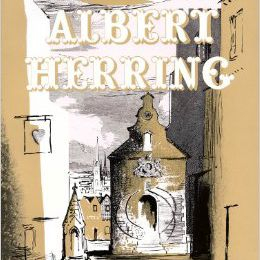
Overview
Synopsis
In the small town of Loxford in East Sussex, the old-fashioned autocrat Lady Billows is in a tizzy. She has assembled a committee of the most important people in town to try to find a suitable Queen for their annual May Day Feast, but none of the young women in town are of suitable moral character. It is pointed out that there is one person in town who is virginal, obedient, upstanding, and moral—Albert Herring, the greengrocer’s son. Albert, timid from years living under his mother’s thumb, is crowned the King of the May. What no one expects is that this event will lead to an evening of drunken debauchery for Albert! Benjamin Britten’s only true comic opera, Albert Herring explores the themes of losing innocence, social stratification, Victorian morality, and coming of age, all cast in the setting of the composer’s brilliantly witty chamber score.
Show Information
Context
Following the premiere of his dark chamber opera The Rape of Lucretia in 1946, Britten began composition that year on a decidedly much more light-hearted opera: Albert Herring. It would be his first and only truly comic opera. Based loosely on a novella by Guy de Maupassant, Albert Herring drew inspiration from the small-town social life of Britten’s own home in Snape, Suffolk. He composed the opera in Snape, completing it in early 1947 for a June 20th premiere at Glyndebourne.
The
to read the context for Albert Herring and to unlock other amazing theatre resources!Plot
Act I
In her grand home in the small East Suffolk town of Loxford, the elderly autocrat Lady Billows is running her servant, Florence Pike, ragged as usual. Florence diligently writes her mistress’s orders in her little notebook, but, stressed, she closes it suddenly in frustration. There is a knock on the door--Lady Billows has assembled a committee of all of the “important” people in the town, including the Vicar, Mr. Gedge; the school headmistress, Miss Wordsworth; Police
to read the plot for Albert Herring and to unlock other amazing theatre resources!Characters
| Name | Part Size | Gender | Vocal Part |
|---|---|---|---|
|
Lead |
Female |
|
|
|
Lead |
Male |
Tenor |
|
|
Lead |
Male |
Baritone |
|
|
Lead |
Female |
Mezzo-Soprano |
|
|
Supporting |
Female |
|
|
|
Supporting |
Male |
Baritone |
|
|
Supporting |
Male |
Tenor |
|
|
Supporting |
Male |
Bass |
|
|
Supporting |
Female |
Mezzo-Soprano |
|
|
Supporting |
Female |
Soprano |
|
|
Featured |
Female |
Soprano |
|
|
Featured |
Female |
Soprano |
|
|
Featured |
Male |
Treble/Boy Soprano |
Songs
Act I
Scene 1: The Home of Lady Billows (Florence, Lady Billows, Vicar, Mayor, Miss Wordsworth, Superintendent Budd)
Scene 2: Mrs. Herring’s Greengrocery in Little Street (All)
Act II
Scene 1: The Vicarage Garden (All)
Scene 2: Mrs. Herring’s Greengrocery in Little Street (Albert, Sid, Nancy, Mrs. Herring)
Act III:
Scene 1: Mrs. Herring’s Greengrocery in Little Street (All)
A song with an asterisk (*) before the title indicates a dance number; a character listed in a song with an asterisk (*) by the character's name indicates that the character exclusively serves as a dancer in this song, which is sung by other characters.
Monologues
Scenes
Key Terms
Sorry! We do not currently have terms for this guide.
Videos
Quizzes
Themes, Symbols & Motifs
Sorry! We do not currently have learning modules for this guide.
Quote Analysis
Sorry! We do not currently have learning modules for this guide.
